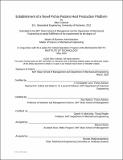Establishment of a novel Pichia Pastoris host production platform
Author(s)
Coleman, Ellen(Ellen M.)
Download1191622559-MIT.pdf (2.355Mb)
Other Contributors
Sloan School of Management.
Massachusetts Institute of Technology. Department of Mechanical Engineering.
Leaders for Global Operations Program.
Advisor
J. Christopher Love and Roy Welsch.
Terms of use
Metadata
Show full item recordAbstract
The Cell Line Development group at Amgen is responsible for manufacturing and optimizing the cell lines utilized in production of Amgen's biologic drug portfolio. Traditionally, these cell lines are produced from mammalian host organisms, primarily Chinese Hamster Ovary (CHO) cells, due to their unique ability to secrete human-like glycosylated proteins. The CHO platform has undergone significant optimization throughout the industry over the past 30 years, however, productivity and efficiency improvements are now becoming harder to realize. Alternative hosts offer a unique opportunity to drive significant cost of goods improvements throughout the biologic drug manufacturing process. Microbial hosts benefit from low genomic complexity, fast doubling times, and can grow to high cell densities in low-cost media. The yeast strain, Pichia pastoris, combines these advantages with the ability to secrete glycosylated products at equivalent product quality levels as CHO-based processes. The Alternative Host Consortium, an MIT-industry partnership, is focused on the advancement of Pichia and other alternative hosts to eventually drive broader commercial utilization and help curb the rising cost of biologic medicines. This project aimed to quantify the strategic advantage of the Pichia host in Amgen's pipeline, and determine when, why and how such a product would be manufactured. The first segment of the work presented here includes various bioprocess development experiments performed to establish proof-of-concept protein production data in Pichia. The results show successful production of two relatively simple proteins at concentrations similar to existing published results. Additionally, chemically defined media and controlled fed-batch fermentation experiments were run to better mimic manufacturing scale operations. The second segment of the project focused on quantifying the strategic cost advantage of the Pichia platform compared with CHO. The business case analysis centered on potential raw material and plant time savings to determine the critical Pichia process features required to be cost competitive.
Description
Thesis: M.B.A., Massachusetts Institute of Technology, Sloan School of Management, in conjunction with the Leaders for Global Operations Program at MIT, May, 2020 Thesis: S.M., Massachusetts Institute of Technology, Department of Mechanical Engineering, in conjunction with the Leaders for Global Operations Program at MIT, May, 2020 Cataloged from the official PDF of thesis. Includes bibliographical references (pages 61-62).
Date issued
2020Department
Sloan School of Management; Massachusetts Institute of Technology. Department of Mechanical Engineering; Leaders for Global Operations ProgramPublisher
Massachusetts Institute of Technology
Keywords
Sloan School of Management., Mechanical Engineering., Leaders for Global Operations Program.